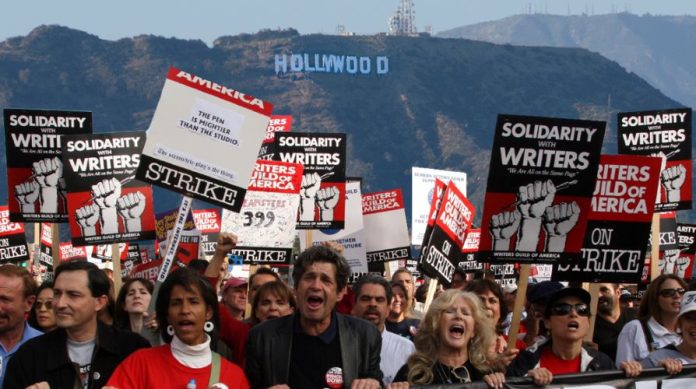Most US film and television productions were put on hold when approximately 160,000 Hollywood actors and actresses went on strike in Los Angeles at midnight on Thursday.
The union that represents actors in television and film, SAG-AFTRA, announced the strike after failed contract negotiations with studios.
After the union board unanimously voted to authorize a strike, SAG president Fran Drescher addressed the media and warned that “this is a moment of history, a moment of truth” and that “if we don’t stand tall right now, we are all going to be in trouble.”
He continued, “What’s happening to us is happening across all fields of labor, and we’re all going to be in danger of being replaced by machines and big business.”
The union was already urging the major streaming companies to accept more equitable profit sharing and better working conditions, and it aimed to defend actors from being replaced by artificial intelligence digital copies.
A further assurance sought by the union is that actors won’t be replaced by computer-generated voices and faces or artificial intelligence (AI).
A number of actors, including Better Call Saul’s Bob Odenkirk, Sex and the City’s Cynthia Nixon, and Hollywood veteran Jamie Lee Curtis, posted on Instagram in support of the strike.
While the strike is ongoing, actors are unable to appear in or even promote their own films.
Thus, as the strike was announced at the Oppenheimer premiere in London on Thursday night, actors Cillian Murphy, Matt Damon, and Emily Blunt left the event.
In the meantime, the AMPTP, the team negotiating on behalf of Walt Disney (DIS), is addressing concerns regarding the use of artificial intelligence, and Netflix (NFLX. O), as well as other significant studios and streaming services, have developed what they call a “groundbreaking AI proposal” that would safeguard actors’ digital likenesses and demand their permission when digital copies are used in performances.
Duncan Crabtree-Ireland, national executive director and chief negotiator for SAG, said the union had rejected the Alliance of Film and Television Producers’ offer because it was “unacceptable.”
“They propose that our background actors should be able to be scanned, get paid for one day’s pay, and their company should own that scan of their image, their likeness, and should be able to use it for the rest of eternity,” said Crabtree-Ireland. “Therefore, if you think that’s a novel idea, I advise you to reconsider.”
The strike means that a significant amount of work will be impossible for films currently in production. Actors won’t be available for reshoots and other crucial steps in the filmmaking process, even in cases where filming has already been finished.
The majority of TV shows that are still in production will also have to be halted, though there may be circumstances where producers and performers work out special arrangements to keep things moving.
The AMPTP issued a warning in a statement, saying that a strike “is definitely not the result we hoped for as studios cannot operate without the performers that bring our TV shows and films to life.”.
Thousands of people who depend on the industry will, unfortunately, face financial hardship as a result of the union’s decision, according to AMPTP.













